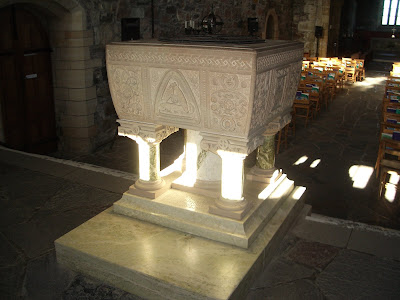At the beginning of the 20th century there was a Marble Quarry on Iona. The marble is a beautiful white with green veins throughout. The altar and baptismal font in the Abbey church are both made with Iona Marble. The marble was shipped throughout Europe and the United Kingdom for building. It closed in the mid 1900’s and was essentially abandoned. There are pieces of machinery remaining. The workers created a sea wall with large blocks of marble and granite to keep the sea from flooding the quarry. The National trust for Scotland is working to preserve as much of the machinery as it can. The quarry is a beautiful and wild place. Definitely a thin place.
Here is the interesting thing. You pretty much can’t there from here. Which sounds pretty strange. It is after all an island. And a relatively small island. You can actually stand on a hill on the island and see both the east and west coast. There is one single lane road on the island, about 2 miles of road. There is about 2 miles of rocky road, and then the rest is sheep trails. Interesting thing about sheep, they can walk on just about any surface, and tend to do so in single file, thus creating a trail. As a human you may or may not be able to follow a sheep trail, and often you don’t know the difference until you have gone a bit farther along a trail than you should have. The Marble Quarry is not on a road, it is not on a rocky track and it is not really of much interest to the sheep.
One more valuable piece of information about the island. It is Scotland. It rains. It rains a lot. I have decided that Iona is simply a tropical island without the palm trees. And in a lush green hilly place with lots of rain you get bogs. Imagine marshland with only a bit more rich black soil. It’s the sort of surface that sucks the shoes right off your feet. And apparently sheep love them so their trails often go through bogs. One more thing about a bog, you really can’t judge the depth of a bog by looking at it.
Armed with that information you can now understand when I say Sunday we set off on an expedition to the Marble Quarry. We went from the village to the bay at the back of the ocean and then along the track to Columba Bay, and then began hiking along the sheep trails. These were apparently mountain sheep, because we found ourselves walking down the side of a steep hill. After two hours, including sand, rocks, bogs, heather and hill, we found the Marble Quarry. It was wonderful. We climbed on the rocks and sat overlooking the sea. It was quite a vista. For our return we decided to walk parallel to a fence line, following sheep track, and discovered bogs of new depths. But the views were amazing, and turns out the sheep knew a short cut. Our return took only an hour and a half.
This is a thin place.

















